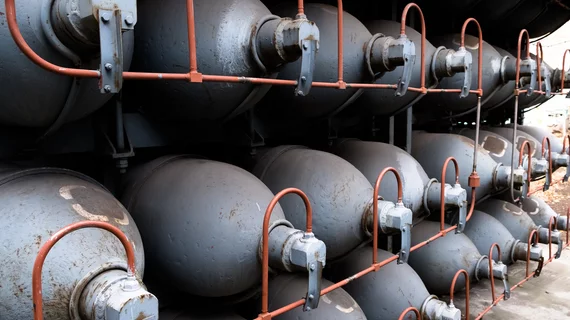Feds move forward with sale of helium reserve, stoking fears of reduced MRI access
The U.S. government on Thursday move forward with a sale of the Federal Helium Reserve, stoking concerns of a potential supply “chain” crisis in medical imaging.
Located in Amarillo, Texas, the stockpile supplies roughly 30% of the country’s helium. Once the deal is complete—likely to highest bidder, industrial gas supplier Messer—the privatization will impact 425 miles of pipelines also spanning Kansas and Oklahoma, NBC news reported.
Imaging advocacy groups including the Advanced Medical Technology Association recently implored the U.S. General Services Administration to postpone the sale. Helium is critical to cooling the magnet in MRI scanners, with American patients receiving roughly 40 million such exams each year.
“Only a few countries worldwide produce helium. U.S. manufacturers tend to rely on the Federal Helium Reserve to meet the needs of the MRI machines installed throughout the country. There’s a real risk that these companies, and global companies that purchase our helium, will be forced to seek sources elsewhere,” AdvaMed President and CEO Scott Whitaker said in a Jan. 22 statement issued ahead of the sale.
As the facility transitions from publicly to privately owned, industry advocates are concerned that regulatory and logistical issues could lead to a temporary shutdown. This likely would not immediately impact providers’ ability to administer magnetic resonance imaging exams. “But we are stressing about this shortage. From a healthcare perspective, MRI machines are the No. 1 concern,” Soumi Saha, senior VP of government affairs at Premier Inc., which contracts with helium suppliers on behalf of hospitals, told NBC.
AdvaMed and the Compressed Gas Association declined to comment on news of the sale Friday. The deal has been in the works for more than a decade, with Congress first mandating it as part of the Helium Stewardship Act of 2013.
Manufacturers such as Philips are working toward a future where MRI machines would require little to no helium. However, AdvaMed’s Whitaker noted that this does not help with the current potential supply chain crisis.
“While innovations to use less helium in medtech are under way, MRI machines are made to last for years as an investment and aren’t easily replaced,” he said in the statement. “AdvaMed urges the White House to delay the sale and privatization of the Federal Helium Reserve until outstanding issues identified by the Compressed Gas Association are resolved. Timely, critical patient care would suffer if helium supplies constricted further.”
A spokesman said that the General Services Administration posted bids and next steps on its website Thursday. Offers included $21 million from Messer for Lot #1, and two bids for Lot #2: $353.35 million from Messer and $30.1 million from Lazarus Energy Holdings. These offers grant the federal government up to 130 days to accept or reject. If the feds choose to move forward, the winner will have 120 calendar days to close the sale.
Messer said Jan. 22 it is “committed” to maintaining an adequate supply throughout the process.
“We understand the importance of helium in scientific, medical and defense applications. Our dedicated and experienced team has implemented proper and safe operations to ensure ongoing supply reliability,” Chris Ebeling, executive VP of sales and marketing in North America, said in a statement.

